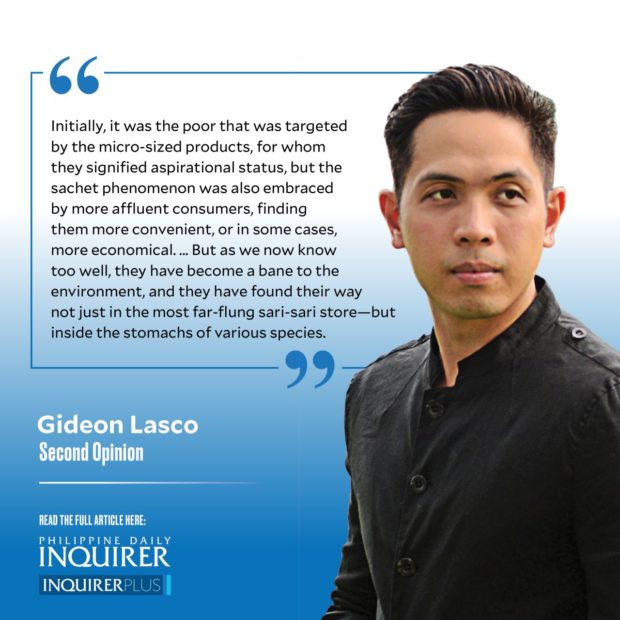The trouble with ‘tingi-tingi’
Thankfully, there is now wide consensus among scientists, environmentalists, and politicians alike that single-use plastics have had a devastating effect on our environment—and have significantly contributed to our notorious distinction of being the third biggest plastics polluter in the world. Even President Marcos Jr. acknowledged as much in his inauguration speech, vowing that “we will clean up.”
Sachets have been singled out as a significant part of this problem. As my colleague Ceres Doyo recently wrote, “People who cannot afford to buy big-size (say, of cooking oil) buy tingi that comes packed for single use, in a sachet. It is these small, empty, discarded plastic wastes that are seen floating after a heavy downpour. They find their way into waterways and farther to the rivers and the seas, and become the scourge of marine life.”
There is a need to act on this problem urgently and decisively. But as we contemplate and debate on the best course of action, it is insightful to revisit how we became what Doyo calls “tingi/sachet nation” in the first place.
Interestingly, the practice of tingi-tingi was not started by the big manufacturers we associate with sachets today. “Long before multinational and large local companies began producing product sachets, there was an active tingi, or piecemeal, market in the Philippines,” notes Ang and Sy-Changco (2007). “Sari-sari stores would buy household items such as sugar, vinegar, shampoo, cooking oil, even cigarettes and candies in bulk, and sell them to their customers piecemeal: by the stick, by the piece, by the tablespoon or cup.”
Ang and Sy-Changco continue: “Drawing on these insights, a shampoo manufacturer decided to try selling their shampoo in packets similar to the small plastic bags that the market was already using. Thus began their successful foray into shampoo sachet marketing. Other manufacturers of a broad range of consumer items soon followed suit.”
Initially, it was the poor that was targeted by the micro-sized products, for whom they signified aspirational status, but the sachet phenomenon was also embraced by more affluent consumers, finding them more convenient, or in some cases, more economical. And so from the 2000s onwards, sachets became such a boon for manufacturers and retailers that it continues to be a case study in marketing classes—and their dominance is in full display in supermarkets today, where there are sachets for everything, from hair-styling wax to tomato paste.
But as we now know too well, they have become a bane to the environment, and they have found their way not just in the most far-flung sari-sari store—but inside the stomachs of various species.
In light of the above historical context, it is clear that manufacturers—which have profited immensely from popularizing sachets—must take responsibility in undoing the damage that has been wrought by their products, not least by investing on and implementing alternate ways of packaging. Alas, many companies have been slow in doing so. For instance, Reuters recently reported that “even as Unilever executives have publicly decried the environmental harm done by this packaging, the multinational has worked to undercut laws aimed at eliminating sachets in at least three Asian countries.”
A recently filed bill by Sen. Loren Legarda articulates other components of a possible solution. In Senate Bill No. 246, she calls for phasing out single-use plastics, defined as “grocery bags, food packaging films and bags, manufacturing water bottles, straws, stirrers, containers, styrofoam/ styros, cups, sachets, and plastic cutlery.” Crucially, her bill focuses on incentivizing consumers and manufacturers who will embrace alternatives, while responsibilizing the latter for collecting, recycling, and disposing of those plastics.
SB 246 also mandates more funding and support for “research on single-use plastic packaging.” In the same way that tingi-tingi was itself a local innovation, surely our researchers can also find ways to replace it with something that makes both practical and environmental sense. In fact, our scholars have already been providing insights on how to address our plastics problem based on their research. For instance, National Academy of Science and Technology academician Agnes Rola has called for a “river-based plan” to manage plastic waste, while also highlighting the role of local government units.
Ultimately, all of the above actions will require leadership at the highest levels of government to create political support and an enabling environment to make all of these steps happen in a concerted and sustained way. Faced with an ever-worsening plastics crisis, we cannot afford to have solutions that are tingi-tingi.
—————-
glasco@inquirer.com.ph

















